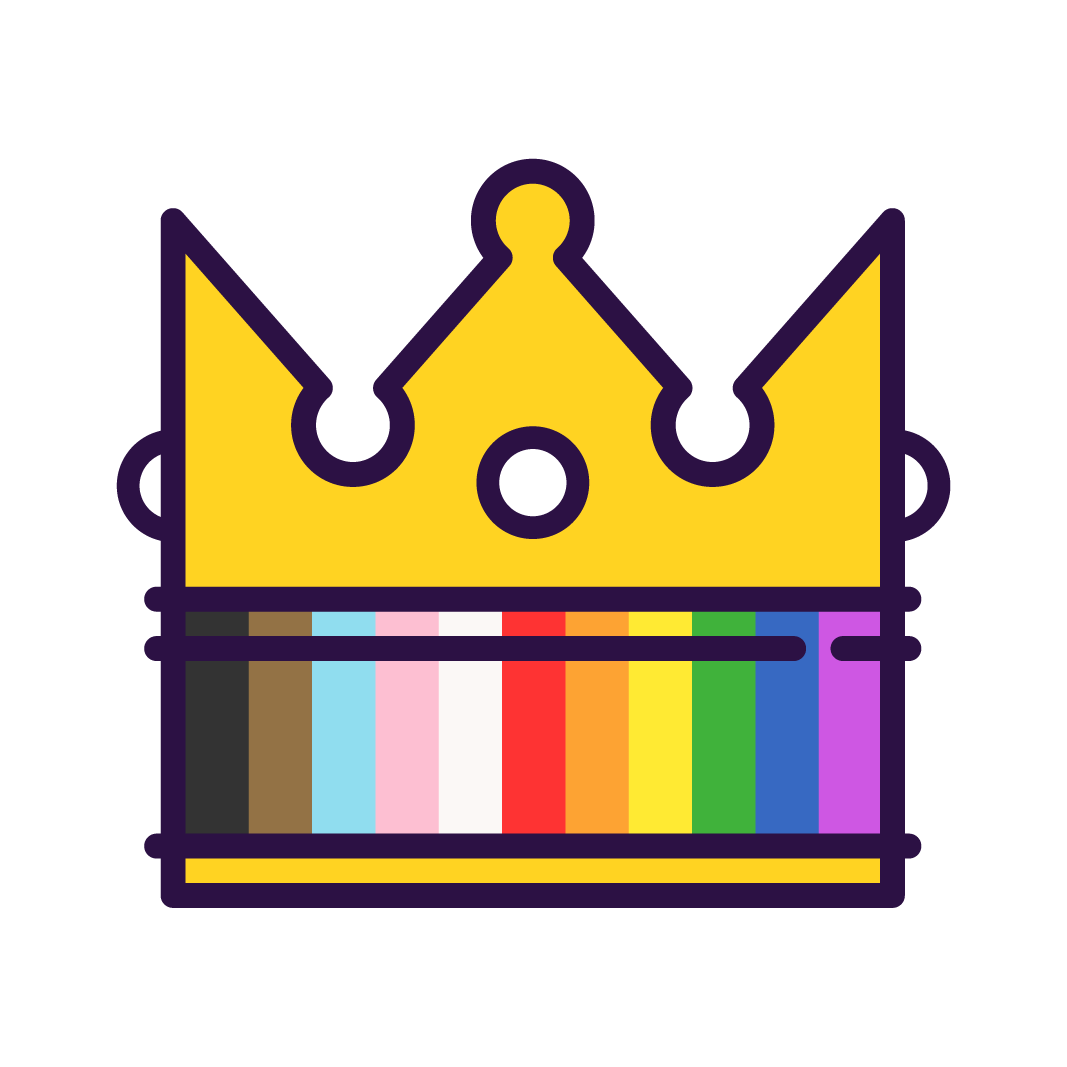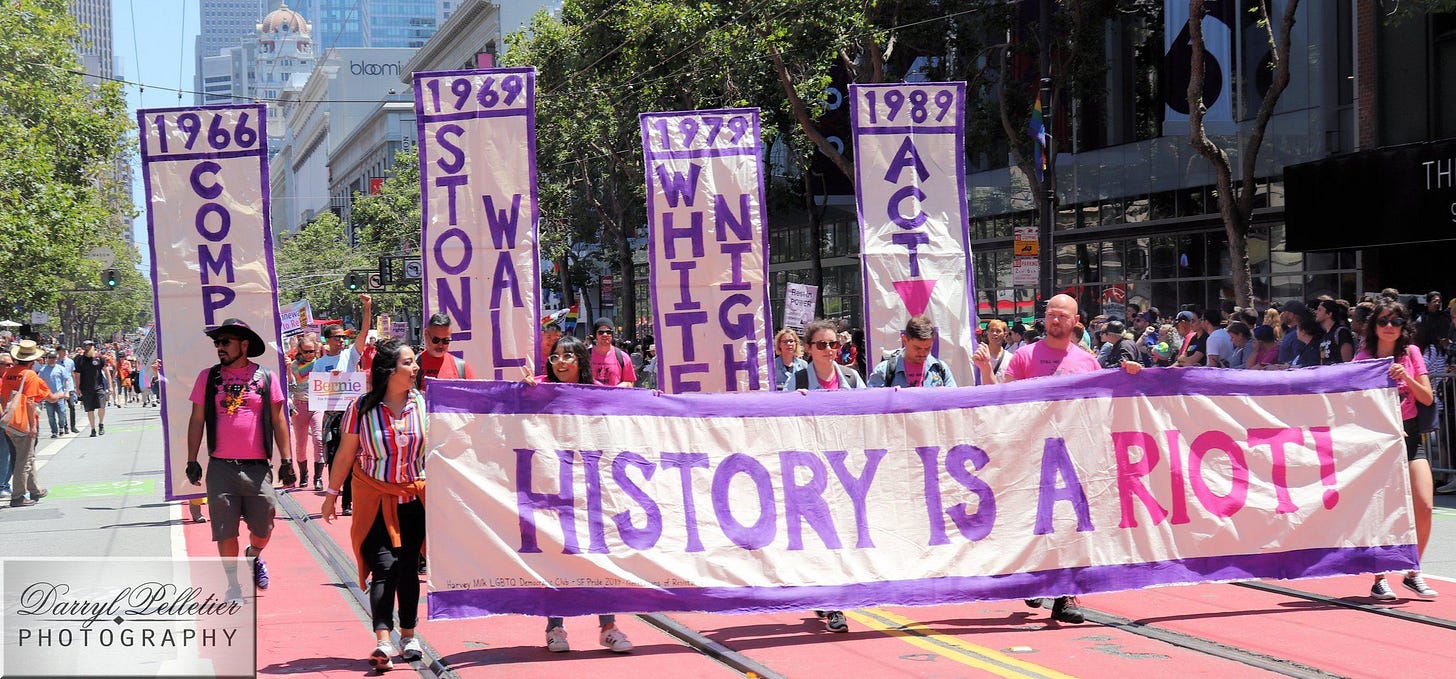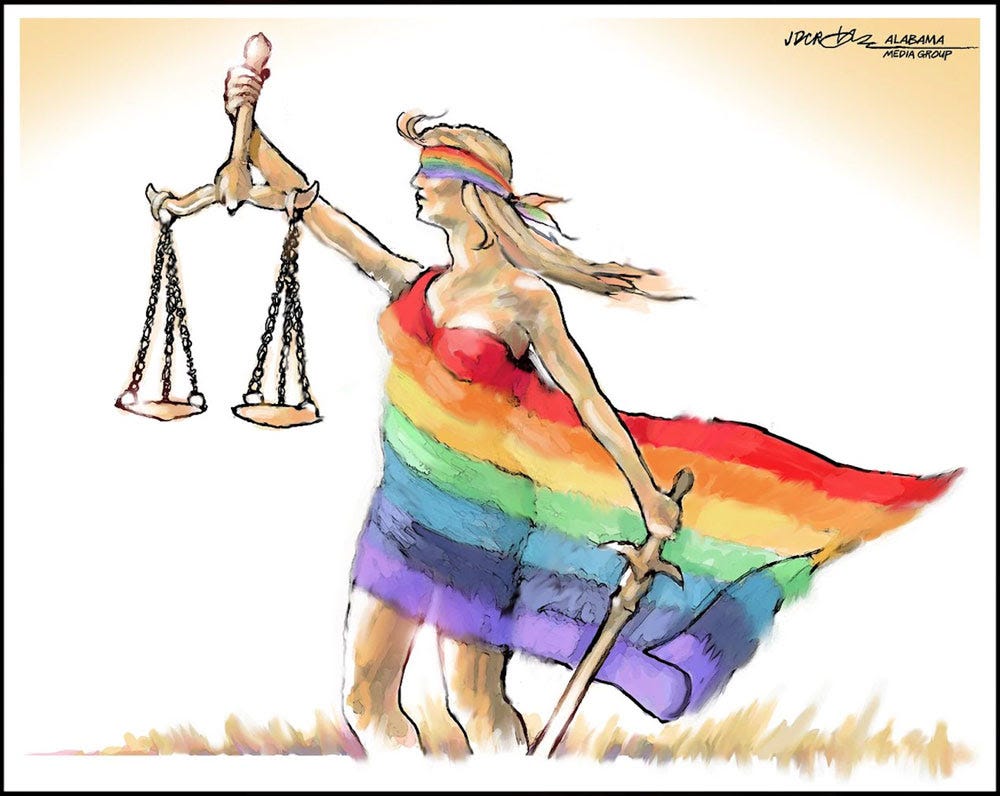
Welcome to Third Cultured, a Queer Reading of the American Empire through crisis-after-crisis — written by yours truly, Kyle Borland.
Thanks for reading. This newsletter is free but – if you’d like to support it or me – subscribe, heart this post, or support my Patreon.
To celebrate Pride, donate to TKO Alabama to help them reach their goal of $75,000 to buy a physical space in Selma, AL for QTPOC organizing. They only $2,500 more!
It’s SF Pride’s golden anniversary this year. 50 years fighting for Queer liberation.


Pride started as a protest in 1970 to commemorate the Stonewall riots that occurred a year before. They were started by Black and Latinx trans women — Marsha P. Johnson and Sylvia Rivera — and lesbian activist Stormé DeLarverie because of the harassment the Queer community faced from the police. For 50 years, LGBTQ+ Americans have given blood, sweat, and tears – many lost their lives – so that Queer people can stand proud in this country.
We demanded space. We demanded rights. We demanded respect.
And, we won.

(Graphic: Pew)
Yet, we still have so far to go. We’re only now beginning to re-center the trans women who ignited our movement in the first place and many of our victories are vulnerable court decisions. We need to pass the Equality Act into law to enshrine nondiscrimination protections into written law for LGBTQ+ people in employment, housing, credit, education, public spaces, and other realms of American life.
We cannot rely on the constitutional interpretations of nine legal sages for the security of our community. We cannot give in to complacency and let up on the pressure that has driven our progress for so many years.
I know it doesn’t feel like it on most days, but we are winning this war.
Despite the setbacks that feel like every step forward is met with two steps back and the orange tyrant in the White House – the last 50 years have changed the world.

It’s easy to point to the monumental decisions and the historical moments, but I would argue the greatest change factor of all has been Pride itself. Not just parades – their impact alone could never be quantified – but the individual sacrament every Queer person must endure for both our own and our community’s survival: coming out.
"If a bullet should enter my brain, let that bullet destroy every closet door."
– Harvey Milk
Mine was a Sunday night – February 27, 2011.
I had spent the weekend in Birmingham with a friend of mine attending UAB. I had spent a couple of weekends up in the city the few months because after coming out to friends at school, I wanted to explore the gay culture available in the city and around the campus. (Okay, you got me. There was a cute guy who ran the Gay Student Union and I was all about him showing me the ropes.)
By then, the only people who didn’t know were my parents. I was even getting rejected from potential roommate setups for my freshman year at Bama because I was letting guys know I was gay beforehand to avoid any potential issues. (A couple of the guys turned me down because they were also gay and didn’t want to out themselves by, well, getting drunk and walking into my bed instead of theirs. Still happened, though.)
If I was telling absolute strangers and traveling over the state to be in-and-around queerness, then it was time to tell my family. It … did not go well. Granted, my frame of mind at the time was “didn’t get kicked out,” so I considered myself one of the lucky ones. It would take years and moving thousands of miles away before I realized how much more I was allowed to have expected of them. From all of them.
From my family to my friends to strangers. I deserved better. Every queer person did.

(Graphic: Pew)
However, I don’t know if I would change what I did, or how I did it, for the world.
Based on private messages and alcohol-induced confessionals, I helped more people by being myself than I ever have through my organizing or my written words. I wish I could say I did it intentionally or that I thought about coming out a lot, but I was more suppressed than that. It wasn’t real to me until October 2010 – I’ll write about what “the closet” actually is another day – and I came out to my parents within six months of saying “I’m gay” out loud for the first time to another human being.
Once it was real to me, I was ready to fight. I was proud to fight.
I demanded space. I demanded rights. I demanded respect.
And, in time, things got better. People started to try. They learned and evolved.
Harvey Milk once said, “I would like to see every gay doctor come out, every gay lawyer, every gay architect come out, stand up, and let that world know. That would do more to end prejudice overnight than anybody would imagine.”
50 years later from the first Pride parades, I think it’s safe to say Harvey was right.
Stay safe and healthy, beautiful people. And, Happy Pride!
xoxo,
Kyle (@kgborland)
PS – Looking for the usual Third Cultured news commentary? Click here!

Key Moments in LGBTQ+ American History
December 10, 1924 – The Society for Human Rights is founded in Chicago. It was the first and oldest-documented gay rights organization in America.
November 11, 1950 – The first national gay rights organization, the Mattachine Society, is founded to change public perception of homosexuality and to cultivate the notion of an "ethical homosexual culture."
January 1958 – The first pro-gay ruling came down at the Supreme Court, with America’s first widely distributed pro-gay publication, ONE: The Homosexual Magazine, winning the right for distribution by USPS.
The Lavender Scare – A moral panic that swept America during the 1950s and 1960s that led to the mass dismissal of homosexuals from government service. Queer people were perceived as a “homosexual menace” – national security risks and communist sympathizers – which justified the bureaucratic institutionalization of homophobic discrimination.
April 21, 1966 – The Mattachine Society staged a "sip-in" at the Julius Bar in Greenwich Village, NYC because the city prohibited the gay patrons because homosexuals were “disorderly.” The action led the New York City Commission on Human Rights to declare that Queer people have the right to be served.
August 1966 – Compton’s Cafeteria Riot in San Francisco, California, the first known incident of collective militant Queer resistance to police harassment in U.S. history.
June 28, 1969 – The Stonewall Uprising in Greenwich Village is credited as the spark that started the modern LGBTQ+ Rights Movement. In May 2016, President Barack Obama designated it the first LGBTQ+ national monument.
June 28, 1970 – The First Pride Parades were held on the one-year anniversary of Stonewall in New York City and San Francisco. NYC commemorated with “Christopher St. Liberation Day” and SF held a "Gay Liberation March" down Polk Street that concluded with a "gay-in" in Golden Gate Park. Both events would grow into the Queer motherships that we know today as NYC Pride and SF Pride.
December 15, 1973 – American Psychiatric Association removes homosexuality from the list of mental disorders but still included “sexual orientation disturbance” and wouldn’t fully remove it until 1987.
January 1974 – Kathy Kozachenko won a seat on the Ann Arbor, Michigan City Council becoming the first openly gay American elected to public office.
December 1975 – Minneapolis becomes the first city to ban discrimination against trans people. The city passed an ordinance barring discrimination on the basis of “having or projecting a self-image not associated with one’s biological maleness or one’s biological femaleness.”
November 8, 1977 – Harvey Milk wins a seat on the San Francisco Board of Supervisors becoming California’s first openly gay politician. Although he only served for 11 months, he is responsible for SF’s ban on discrimination in public accommodations, housing, and employment on the basis of sexual orientation. On November 27, 1978, former supervisor Dan White assassinated Milk and then-Mayor George Moscone in San Francisco City Hall.
May 21, 1979 – The White Night Riots in San Francisco followed the lenient sentencing of Dan White for the assassinations of San Francisco Mayor George Moscone and of Harvey Milk. More than 5,000 protesters attacked City Hall and did hundreds of thousands of dollars worth of property damage in the surrounding area. The next day 10,000 people gathered in the Castro, SF’s gay neighborhood, to commemorate what would have been Milk's 49th birthday.
October 14, 1979 – The National March on Washington for Lesbian and Gay Rights is held, the first such march, drawing 75,000–125,000 people.
July 3, 1981 – The first story of a rare pneumonia and skin cancer found in 41 gay men in New York and California. The CDC initially refers to the disease as GRID, Gay-Related Immune Deficiency Disorder.
March 10, 1987 – AIDS advocacy group ACT UP (The AIDS Coalition to Unleash Power) is formed in response to the devastation wrought by AIDS in NYC. In 1989, ACT UP protested pharmaceutical price-gouging on the NYSE floor stopping trading for the first time in history. A few months later, 4,500 protesters would participate in the first “Stop the Church” action to protest the Catholic Church’s deadly, homophobic, and misogynistic AIDS and abortion policies. ACT UP = the AIDS Coalition To Unleash Power.
October 11, 1987 – The Second National March on Washington for Lesbian and Gay Rights, or “The Great March,” is held to demand President Ronald Reagan acknowledge the AIDS crisis (which he wouldn’t do until the end of his presidency). An estimated 750,000 attended and it was the first showing the AIDS Memorial Quilt. On December 1, 1988 the World Health Organization organized the first World AIDS Day and on August 18, 1990
President George Bush signed the Ryan White Care Act, a federally funded program for people living with AIDS. The red ribbon would come in 1991.December 21, 1993 – "Don’t Ask, Don’t Tell” is implemented.
September 21, 1996 – President Clinton signed the Defense of Marriage Act into law, defining marriage as between one man and one woman.
April 1, 1998 – Coretta Scott King, widow of civil rights leader Martin Luther King, Jr., called on the civil rights community to join the struggle against homophobia despite an expected fervent backlash.
April 26, 2000 – Vermont becomes the first state to legalize civil unions and registered partnerships between same-sex couples.
June 26, 2003 – In Lawrence v. Texas, SCOTUS deemed sodomy laws unconstitutional, legalizing gay sex.
May 18, 2004 – Massachusetts becomes the first state to legalize gay marriage.
November 4, 2008 – California voters approved Prop 8, banning gay marriage in the state and igniting the viral “NOH8” campaign. On August 4, 2010, a federal judge San Francisco will rule Prop 8 unconstitutional setting up, setting up the SCOTUS case – Hollingsworth v. Perry – which instituted gay marriage in CA.
October 28, 2009 – The Matthew Shepard Act Hate Crimes Prevention Act added sexual orientation and gender identity to federal anti-discrimination laws.
December 18, 2010 – Congress repealed the “Don’t Ask, Don’t Tell” policy which removed 13,000+ service members from the military for being LGBTQ+.
January 20, 2015 – President Obama became the first president to acknowledge lesbians, bisexuals, and transgender people during a State of the Union.
June 26, 2015 – SCOTUS ruled in Obergefell v. Hodges that same-sex marriage is legal in all 50 states.
June 15, 2020 – SCOTUS ruled Federal employment protections cover LGBTQ+ people under Title VII of the Civil Rights Act of 1964, which outlaws discrimination based on “race, color, religion, sex, or national origin,” necessarily includes a prohibition on discrimination based on sexual orientation or gender identity. The ruling was from three consolidated cases: Bostock v. Clayton County, Altitude Express v. Zarda, and R.G. & G.R. Harris Funeral Homes v. EEOC.

(Image: Darryl Pelletier)
“In Title VII, Congress outlawed discrimination in the workplace on the basis of race, color, religion, sex, or national origin. Today, we must decide whether an employer can fire someone simply for being homosexual or transgender. The answer is clear. An employer who fires an individual for being homosexual or transgender fires that person for traits or actions it would not have questioned in members of a different sex. Sex plays a necessary and undisguisable role in the decision, exactly what Title VII forbids.”
“When the express terms of a statute give us one answer and extratextual considerations suggest another, it’s no contest. Only the written word is the law, and all persons are entitled to its benefit.”
– Justice Neil Gorsuch in the majority opinion for Bostock v. Clayton County
One Last Thing (Graphic: Reckon)

Enjoying the newsletter? Share it with friends and family!



